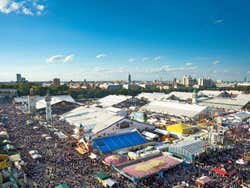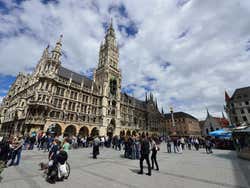
History of Munich
Discover the history of Munich, from humble beginnings as a market established by Henry the Lion in the 12th century to the modern, industrial city and tourist attraction it is today.
Munich (München in German) means "home of the monks", a name that stems from the Benedictine monastery founded in the area around the mid-8th century. While there is evidence of settlements in the area dating back to the Neolithic period, and the wider region of Bavaria has a history entwined in the Roman Empire, the first time that Munich was mentioned by in a document was in 1158, and this date is generally accepted as its foundation.
Medieval Munich
In 1157, Henry the Lion, one of the most powerful German princes of his time, granted the Benedictine monks the right to create a market on the Salt Road and built a bridge over the Isar River to reach it, destroying a previously built bridge in the process. By 1175, Munich had been granted city status and a fortified town wall was built around it. Henry the Lion did not have the same success: he was deposed, and Munich came under the power of the Wittelsbach dynasty, who would rule Bavaria until 1918.
Throughout the Medieval era, Munich would grow in size and in wealth under the Wittelsbach line of Holy Roman Emperors. While the city was destroyed by fire in 1327, and again in 1429, some of the architecture resulting from the massive rebuilding efforts that follows still remain: the Old Town Hall dates back to 1310, and the emblematic Frauenkirche was constructed in 1494.
Bavarian capital
From 1506, when Munich was named capital of Bavaria, the city became a centre for the German counter reformation and for renaissance arts, and thrived until the Thirty Years' War, when it was occupied by Sweden in 1642 and subsequently suffered a plague epidemic which wiped out a third of its population.
Nevertheless, the post-war period saw Munich begin to prosper again. Under the control of the Habsburgs during the 18th century, it developed into a hub of Baroque life with buildings such as the Theatine Church and the Nymphenburg Palace being built. The first Oktoberfest was held in 1810 in honour of the marriage of King Ludwig I of Bavaria and Princess Therese of Saxe-Hildburghausen, and the 19th century saw it was booming as a centre of arts, literature and music with elegant Neoclassical buildings.
Despite these perceived successes, Munich was a hotbed for political discontent, and there were a number of uprisings across the country in the mid-1800s, especially once the industrial revolution arrived, bringing it a massive population influx from the countryside. Otto von Bismarck unified the German Empire in 1871, which lasted until the end of World War I.
World Wars & Nazism
While suffering little damage to the city itself, World War I blockades starved its population. In the years following the war, Munich became a centre of political unrest yet again, and much of the city was polarised between the extreme right and extreme left. This situation saw the rise to power of Adolf Hitler, and in 1923 one of Munich's famous beer halls was the site of his attempted coup d'état known as the Beer Hall Putsch.
While the "Putsch" failed that time, when Hitler and the Nazis took control of Germany in 1933, Munich became the ideological centre of National Socialism, being referred to as the "Capital of the Movement". Many National Socialist Party buildings were built around the city, and the first Nazi Concentration Camp was created in Dachau, not far from Munich. Despite, or maybe because of this, the city was also the base of a student resistance movement called the White Rose, who actively opposed the Nazi regime.
During World War II, Munich was bombed heavily, and its historic centre almost completely destroyed by the Allies, before finally being occupied by the US in 1945.
Modern Munich
The post-war period saw Munich completely and carefully rebuilt, preserving its original street grid and restoring many historic buildings. The population grew, reaching 1 million people in 1957, as did its role in the German economy, politics and culture.
In 1972, the city hosted the Olympic Games in celebration of a new and democratic Germany. However, the event ended in tragedy, with 17 people being killed in a terrorist incident.
Munich today is a city that thrives in industry as well as tourism. It is cosmopolitan, with a beautiful historic centre, vibrant cultural life, a high standard of living and low crime rates.


